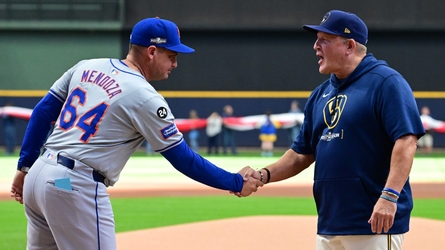Momentum in baseball can be a notoriously fleeting intangible, especially in the postseason, yet watching the Mets roll the Milwaukee Brewers, 8-4, in Game 1 of the Wild Card series on Tuesday, you couldn’t help thinking they were still flying from Monday’s epic comeback, playing with a renewed confidence that translated to clutch hitting.
Makes you also think maybe they can make a run here in October.
We’ll see about that, but beating up on the Brewers, a team that had dominated them in the regular season with their speed and bullpen, was a huge first step in that direction.
Clutch hitting and their own bullpen were the keys, as the Mets scored five runs, all with two outs, in the fifth inning, and got three perfect innings from Jose Butto and Ryne Stanek on a night when Edwin Diaz wasn’t available.
Throw in still another OMG moment from Jose Iglesias — who surely leads the world in infield hits by now — as his head-first slide beat out a play at first base, enabling the tying run to score in that fifth inning, and this looked like the team that played at such a high level the final four months of the season.
Yet let’s not overlook a sub-plot that in many ways proved pivotal, as Carlos Mendoza outmanaged the Brewers’ Pat Murphy in what was each other’s first postseason game.
In short, Mendoza pushed all the right buttons, from his lineup choices — Jesse Winker — to his in-game moves, most notably sticking with Luis Severino when the manager’s postseason handbook these days says the way to win in October is by being ultra-aggressive.
Contrast that to Murphy, who went to the bullpen too early, even after his No. 1 starter, Freddy Peralta, had settled in after four innings, and then went to lefty Aaron Ashby for right-hander Joel Payamps, opening the door to get beat by lefty-killers Mark Vientos and J.D. Martinez.
Managers almost always are a story in October, for good or bad, because every move becomes magnified, and while you can make the case that Murphy was playing to his strength, with a bullpen that posted the second-best ERA in the majors this season, how many times have we seen managers pay for pulling starters too quickly in the postseason?
It’s a fine line, and sometimes they can be just as guilty of sticking with starters too long, as Aaron Boone did in his first few postseasons with the Yankees.
In that respect it often comes down to feel vs. sticking to a pre-planned guide and, to be fair, sometimes it’s also simply a matter of the players doing their job.
But in any case, Mendoza proved this season that he has a good feel. A feel for his players, a feel for in-game moves, and for knowing when to be guided by matchups rather than when to put trust in certain individuals.
On Tuesday, for example, if any pitcher was going to be done after four innings, it figured to be Severino, who was leaving a lot of pitches in the middle of the plate in the early innings, looking like the guy who came in with a 5.15 postseason ERA.
Even he admitted to reporters when asked, “I thought I was out” after the fourth. Yet Mendoza stuck with him, perhaps in part because he had a thin bullpen on this night, but also because he has a good read on him, going back to their days together with the Yankees.
In any case, it paid off in a big way. For after the Mets had their five-run rally in to take the lead in the top of the fifth, Severino showed some grit by delivering two shutdown innings, getting through six innings to set up the finish for Butto and Stanek.
On the other hand, besides going to the pen early, Murphy’s real mistake was going to Ashby with two outs and the game tied, wanting the lefty-lefty matchup with Nimmo.
It was a mistake in part because Nimmo has hit lefties as well or better than right-handers for a couple of seasons now and has a higher batting average against lefties this season. But the bigger mistake was how that move set the table for the Mets when Nimmo kept the inning going with an infield single to deep short, going the other way.
At that point, Ashby, because of the three-batter rule for relievers, had to face Vientos, a lefty-killer, and that resulted in a two-run single to center. Furthermore, it allowed Mendoza to pinch-hit Martinez for Winker, and he delivered a signature opposite-field single to right to drive in two more runs.
Chalk up Round One to Mendoza.
It could have gone the other way, of course. Leaving in Severino could have backfired while the Brewers’ bullpen could have lived up to its regular-season performance.
But there’s no getting around the mistake of exposing Ashby to Vientos and Martinez.
That’s the thing about the postseason. Managing is often more about avoiding a blunder than winning with some type of brilliant strategy.
Mendoza had established himself in his first season as a guy who knew how to manage and could handle New York, but you never know what October might bring.
With that in mind, in his first go-round Mendoza further enhanced his reputation, offering one more reason to believe these Mets have a chance to make some noise in this postseason.
Read the full article here


























